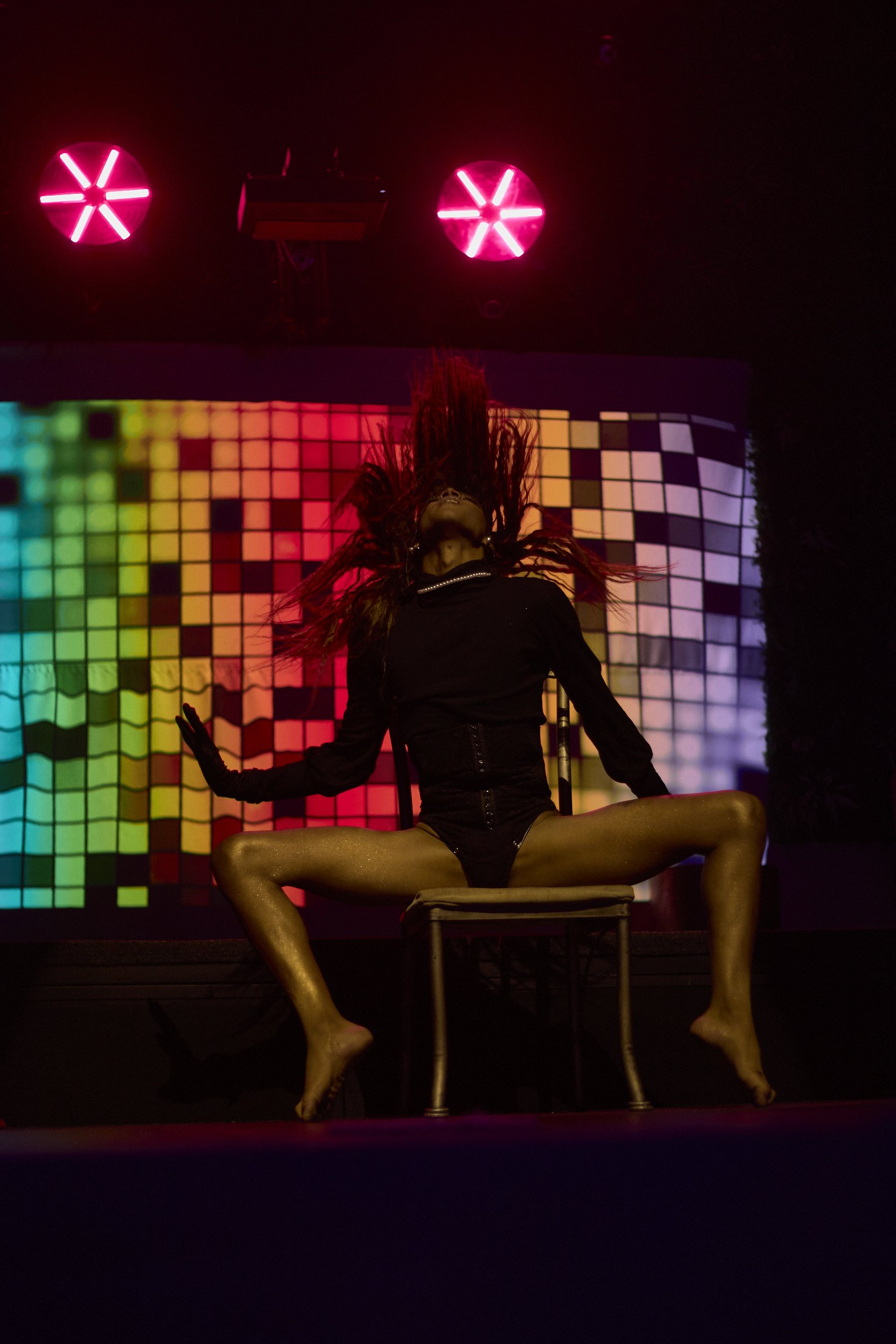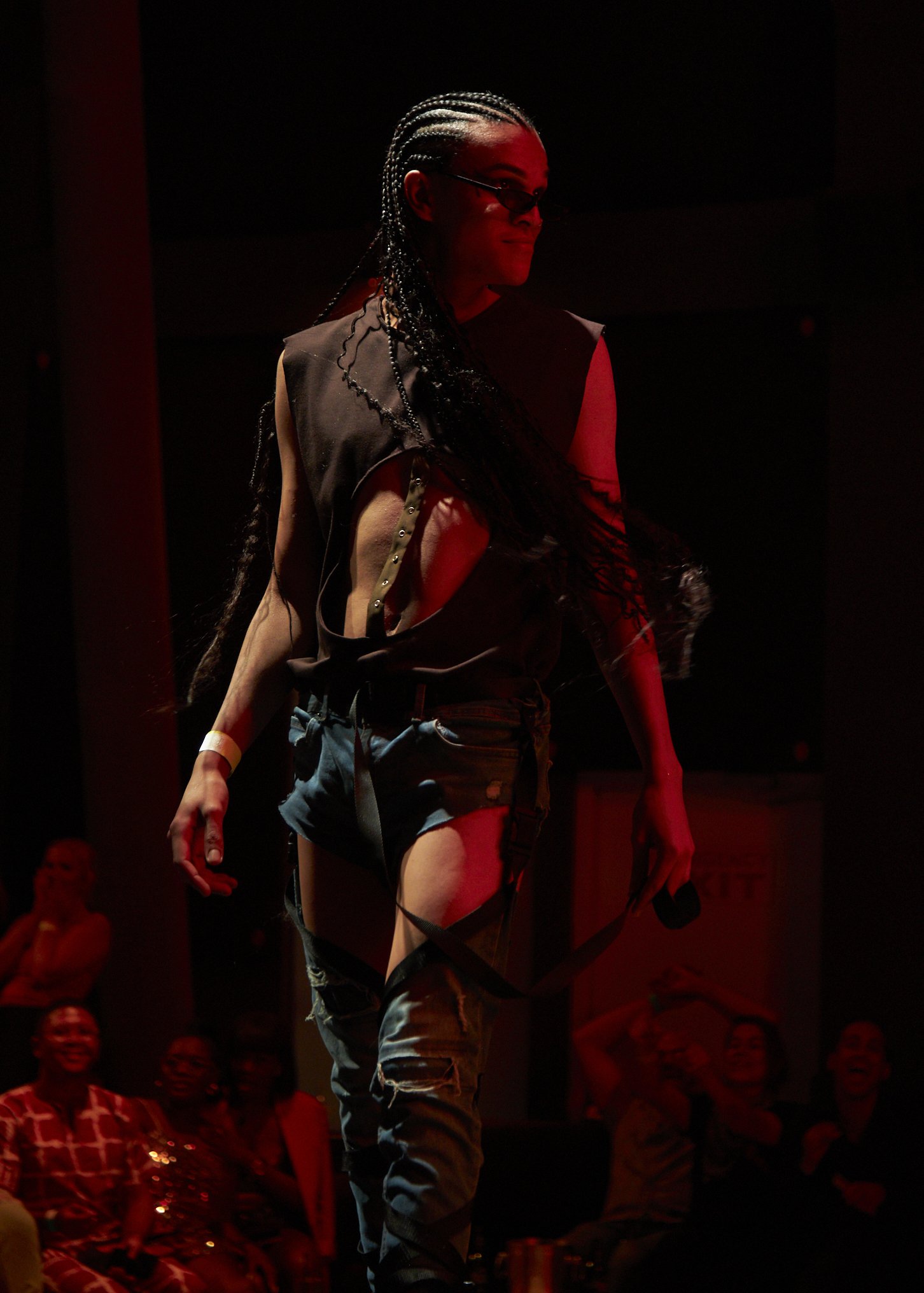THE DRAG NIGHT AT THE HEART OF LGBTQ RIGHTS IN NAMIBIA
Amid a growing LGBTQ+ civil rights movement and multiple Supreme Court hearings that represent a crucial moment for equality in the country, Drag Night Namibia provides a space for queer joy and solidarity. Words and images by Chris de Beer-Procter. Published by Huck Magazine and African Arguments.
04 March 2023: Miss Mavis Dash, The Mother Of The House Of Dash hosted Drag Night Namibia's second anniversary show, Windhoek, Namibia. Photograph: Chris de Beer-Procter
It’s Drag Night in Namibia and The Loft for You, a venue in the country’s centrally-located capital of Windhoek, is filled with revellers. The diverse crowd, which ranges broadly over age, race, sexual and gender expression, filter through the doors eagerly. Once they pass the various intersectional Pride and civil rights groups’ flags, they are delighted by a cast of charismatic performers. Between the sultry, shimmying performances, exploding with queer joy, activist Omar van Reenen takes the stage.
“What we are doing here today is massive,” they say. Behind them hangs a rainbow flag bearing the word ‘Peace’. The venue is near capacity. The crowd, which is the largest to attend Drag Night Namibia since its inception in 2020, is electric. “Taking up space in a born-free Namibia,” Omar continues. “This is what our liberators fought for. Because their blood waters our freedom, too!” The crowd erupts into cheering applause.
04 March 2023: Selena Dash of The House of Dash leads the cast entrance of Drag Night Namibia's second anniversary show, Windhoek, Namibia. Omar van Reenen, a key figure in the movement and founder of Equal Namibia took to the stage later in the evening to say, “what we are doing here today is massive. Taking up space in a born-free Namibia.” They continue, “this is what our liberators fought for. Because their blood waters our freedom, too!” Photograph: Chris de Beer-Procter
04 March 2023: The Loft for You hosted Drag Night Namibia's second anniversary show, Windhoek, Namibia. "With all the painful stuff that’s going on in the fight, it’s good to be in a safe space with the group of LGBT people. I broke down a few times, because it’s so special. We’re all fighting the same fight," reflects Daniel Digashu, a litigant in a same-sex marriage case which was heard at the Namibian Supreme Court the day before. Photograph: Chris de Beer-Procter
Namibian drag queens, Coco and Miss Shy Dash take a bow during Drag Night Namibia's second anniversary show, Windhoek, Namibia, Saturday, 04 March 2023. “In its essence, drag is a political statement,” says Rodelio Lewis, the founder and CEO of Drag Night Namibia. Photograph: Chris de Beer-Procter
This is especially true in Namibia, where the LGBTQ+ community’s fight for civil rights has ramped up significantly over the last few years. For a country which is so small in population (only 2.5 mil), the number of legal challenges to state-sanctioned homophobia has been astounding. In fact, this evening’s event falls between two Supreme Court hearings related to the advancement of LGBTQ+ civil rights that have been years in the making.
On March 3rd, the court heard a challenge to the state’s refusal to recognise same-sex marriages concluded in other countries, thus disqualifying families with foreign-born spouses of queer Namibians from claiming domicile to live and work. Days later, on March 6, the Supreme Court heard a case regarding the parental rights of same-sex families. The outcome of these cases will have monumental implications for queer Namibians and their families for generations to come.
Namibian drag queen Selena Dash from The House of Dash performs at Drag Night Namibia's second anniversary show, Windhoek, Namibia, Saturday, 04 March 2023. Photograph: Chris de Beer-Procter
The country’s small but dedicated civil rights movement, which is largely spearheaded by young people, has not only rallied around these legal challenges, but also around spaces like Drag Night that cater to other sides of the queer experience – that of joy, community and celebration. As Rodelio reflects, “It’s one part of the puzzle of this fantastic collaborative effort from queer and allied organisations in the movement for equality and inclusivity.”
04 March 2023: Miss Shy Dash, of The House Of Dash performs at Drag Night Namibia's second anniversary show, Windhoek, Namibia. Photograph: Chris de Beer-Procter
For many who attend, especially those engaged in activism, it’s a meaningful experience. “With all the painful stuff that’s going on in the fight, it’s good to be in a safe space with our people,” says Daniel Digashu, who is a litigant in the previously mentioned marriage recognition case. “I broke down a few times, because it’s so special,” he continues. “I feel like we deserve that, that bit of happiness.”
Centuries into its legacy, drag still provides a vessel for LGBTQ+ folk to experiment with and express their gender, while also mobilising for the ever-present need to fight for civil rights in Namibia and all over the world.
04 March 2023: Selena Dash from The House of Dash interacts with an audience member, Windhoek, Namibia. "It’s something very beautiful for people to experience someone in their most vulnerable and true self and visa versa for someone to showcase that and receive such love and respect, it’s a very community building experience and it’s very beautiful," says Rodelio Lewis. Photograph: Chris de Beer-Procter
04 March 2023: Whilzahn Gelderbloem, an audience member was invited to take to the stage at Drag Night Namibia's second anniversary show, Windhoek, Namibia. Photograph: Chris de Beer-Procter
04 March 2023: The crowd enjoys a performance, Windhoek, Namibia. Drag Night Namibia is one of the few queer safe spaces for the Namibian LGBTQ community. Photograph: Chris de Beer-Procter
Anyone familiar with drag scenes from almost anywhere in the world would feel Omar’s words. Throughout its history, drag artistry has been tied to subversive, queer politics which challenges heteropatriarchal power systems and advocates for LGBTQ+ equality through the radical and often playful subversion of gender norms. For decades, the drag club has been a natural home for activism.
“In its essence, drag is a political statement,” says Rodelio Lewis, the founder and CEO of Drag Night Namibia who also hosts the events as his drag persona Miss Mavis Dash. “It’s very satirical at times, but also most of our performers take this so seriously. It is a political statement every single time they step on stage or step out in drag.”
04 March 2023: Coco took the stage with a lively belly-dancing number, Windhoek, Namibia. Photograph: Chris de Beer-Procter
04 March 2023: Selena Dash of The House of Dash performs at Drag Night Namibia's second anniversary show, Windhoek, Namibia. Photograph: Chris de Beer-Procter
04 March 2023: Gigi Has Arrived from The House of Arrivals and Miss Mavis from The House of Dash take the stage at Drag Night Namibia's second anniversary show, Windhoek, Namibia. "When you experience it, you feel on top of the world, like whatever you think creatively, can be a reality. And the most beautiful thing is there are people that are celebrating it with you," says Rodelio Lewis, AKA Miss Mavis. Photograph: Chris de Beer-Procter
04 March 2023: The crowd enjoys a performance, Windhoek, Namibia. "Queer spaces were so devoid in Namibia when I was growing up. To see it changed and so visible, to have a thriving and bustling queer community where you can find and identify yourself...man what a joy. What a thrill," reflects Sven-Eric who performed at Drag Night Namibia. Photograph: Chris de Beer-Procter
04 March 2023: Activists and allies at the Positive Vibes Trust organisation's table enjoy the show. Daniel Digashu, a litigant in the same-sex marriage recognition case sits in the middle (blue collared shirt). "Drag night is such a breath of fresh air.. To see gay people happy, in one place as a collective. The amount of joy, with all the painful stuff that’s going on in the fight, it’s good to be in a safe space with the group of LGBT people," Daniel reflects., Windhoek, Namibia. Photograph: Chris de Beer-Procter
04 March 2023: Omar van Reenen, founder of Equal Namibia stands before a pride flag tinted by venue lights at the entrance of Drag Night Namibia's second anniversary event, Windhoek, Namibia. van Reenen is a key organising figure in Namibia's fight for LGBTQ rights. Photograph: Chris de Beer-Procter
04 March 2023: Jameson Klazen, an audience member was invited to take to the stage at Drag Night Namibia's second anniversary show, Windhoek, Namibia. Non-performer guests were brought onto the stage at various points in the show to strut to ruptuous applause.Photograph: Chris de Beer-Procter
04 March 2023: As the performances ended, the dancefloor opened at Drag Night Namibia, Windhoek, Namibia. Photograph: Chris de Beer-Procter

















